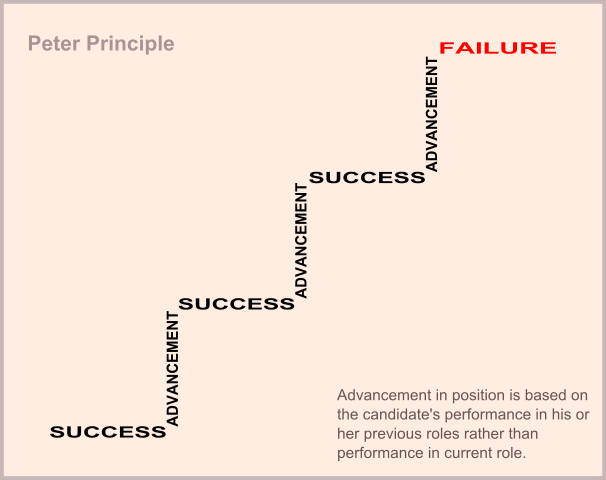This is the Reason for that Incompetent Boss

I recently learned about the Peter Principle in class, and I can't believe I hadn't heard about it before. The Peter Principle is a concept in management theory elaborated by Laurence Peter that states,
the selection of a candidate for a position is based on the candidate's performance in their current role, rather than on abilities relevant to the intended role. Thus, employees only stop being promoted once they can no longer perform effectively, and "managers rise to the level of their incompetence". Source: Wikipedia
Think about this for a second... If you are promoted into a role that is beyond your abilities and you do not grow into those abilities, you remain where you are without having the skills to be there.
Have you ever had that boss that was a fantastic individual contributor who was promoted to manager, but as a manager absolutely sucked? Or the person that was outstanding in one position, but after a promotion can barely keep up with the new responsibilities? And since they are not getting good reviews where they are, they will not get promoted again, which means they are suck there. If they go back down a level to where they were rockstars, they lose money and integrity. A lateral move probably means developing new skills, and not everyone wants to do that. So there they stay where they are, stuck at a level they can't get promoted from because they are no longer good enough.
This happened to me back when I was in tech. I was a superstar at one level that took a promotion into a new team and failed. I did the job fairly well for a while, but it was obvious that I was not going to achieve the superstar status I had in my previous position. I was not bad enough to fire, but not good enough to promote.
My choices were either: mediocre middle manager for life, lateral move into something I didn't love as much, but maybe could be good at, or leave the company and find something different.
Lucky for me for me, I was young enough and adventurous, so I took the plunge and after 5 years vesting, I went to another company. The idea of being permanently stuck in a job I was not good at in my late 20s felt like a career death sentence. That being said, I have had quite a bit of managers that fit perfectly the Peter Principle. If only I would have known about this then, I would have saved myself quite a few drinks trying to understand how the heck they got where they were!
Do you have a personal example of the Peter Principle in action?
Photo Credit:
Peter's Principle image CC0 1.0 Universal Public Domain Dedication

Planning the next installment.
All Questions, Comments, Concerns, Ideas Welcome!
Transfer 0.200 SBD or 0.250 steem to @mrbean1 and put the link of your post in the public memo I GIVE you FOLLOW AND 5 UPVOT and resteem by @mrbean1
click here to read more about me
Wow! My dad and I were just talking about this a few days ago. I was telling him about someone at my former company who "climbed the ladder" via charm and deception about his experience and abilities. His situation was slightly different than the Peter Principle, but it's still interesting that today I see this on here!
The charm and deception ladder climbers are even worse, because they know they can't do the job. I have always wondered what they think they will do when they get there, "fudge it"? I believe in "fake it until you make it", but only in cases when I know I can make it. People who charm their way to the top know they can't do it, so they are probably not even happy once they get there because they are always worried that someone will figure out they shouldn't be there in the first place!